Animalia

Large Earth Bumblebee
Bombus terrestris

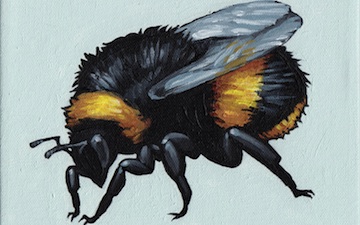
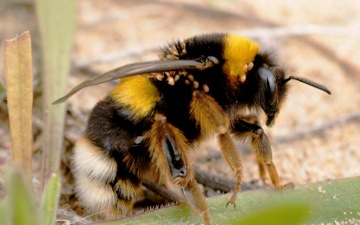
4 POINTS
• Bombus terrestris has a MOVE of 2.
• Bombus terrestris can find its nest from as far as 13 kilometres away!
Cool, Warm
Graphic by Erin Englishbreakbot.deviantart.com/
Photo by Ferran Pestañawww.flickr.com/photos/ferranp/
Bombus terrestris, the buff-tailed bumblebee or large earth bumblebee is one of the most numerous bumblebee species in Europe. The queen is 2–2.7 cm long, while the workers are 1½–2 cm. The latter are characterized by their white-ended abdomens and look (apart from their yellowish bands being darker in direct comparison) just like those of the white-tailed bumblebee, B. lucorum, a close […] read more

Tennessee Warbler
Oreothlypis peregrina

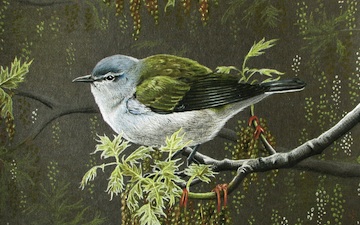

5 POINTS
• Oreothlypis peregrina has a FLIGHT of 2.
• Despite its common name, Oreothlypis peregrina neither breeds nor over-winters in the state of Tennessee.
Cool, Warm
Graphic by Jacqueline Raejacquelinerae.deviantart.com/
Photo by Jerry Oldenettelwww.flickr.com/photos/7457894@N04
The Tennessee Warbler, Oreothlypis peregrina, is a New World warbler. It breeds in northern North America across Canada and the northern USA. It ismigratory, wintering in southern Central America and northern Colombia and Venezuela, with a few stragglers going as far south as Ecuador. It is a very rare vagrant to western Europe. This bird was named from a specimen collected in Tennessee where it may appear […] read more

Red Paper Wasp
Polistes annularis

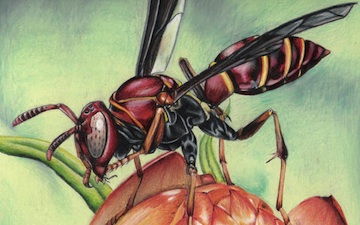
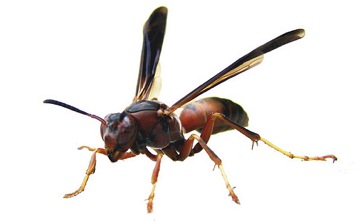
3 POINTS
• Polistes annularis has a MOVE of 2
• Polistes annularis forms its papery nests in trees, shrubs and some buildings.
Cool, Warm
Graphic by Jacqueline Raejacquelinerae.deviantart.com/
Photo by Kittenwantswww.flickr.com/people/kittenwants/
Paper wasps are 3⁄4 to 1 inch (1.9 to 2.5 cm)-long wasps that gather fibers from dead wood and plant stems, which they mix with saliva, and use to construct water-resistant nests made of gray or brown papery material. Paper wasps are also sometimes called umbrella wasps, due to the distinctive design of their nests[1] […] read more

White Tiger
Panthera tigris

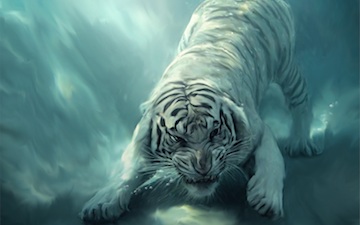
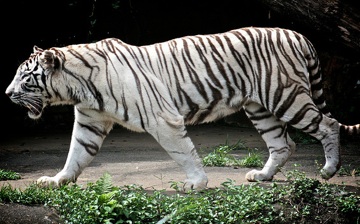
6 POINTS
• Panthera tigris has a MOVE of 2.
• The white tiger is not a separate subspecies of tiger. Its white fur is the result of a genetic colour morph.
Cool, Warm, Hot
Graphic by Dafne-1337artwww.dafneart.com/
Photo by Anderson Manciniwww.flickr.com/photos/ektogamat/
White tigers are a color morph of any subspecies of tiger whose fur is white or almost white with black to light ash-grey stripes, though it is not a separate subspecies itself. To date, the only known white tigers have been from the Bengal tiger subspecies.[1] Compared to normal coloured tigers without the white gene, white tigers […] read more

Horned Puffin
Fratercula corniculata

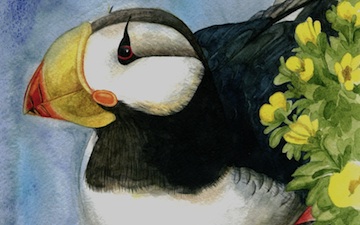
Sorry, there is no photo available. If you have one, please submit
here
.
7 POINTS
• Fratercula corniculata has a FLIGHT of 2.
• Fratercula corniculata nest in bluffs of fractured rock or crevices in cliff faces near the shoreline.
Cold, Cool
Graphic by latyshoffalatyshoffa.deviantart.com/
The Horned Puffin (Fratercula corniculata) is an auk, similar in appearance to the Atlantic Puffin; this bird’s bill is yellow at the base and red at the tip. It is a pelagic seabird that feeds primarily by diving for fish. It nests in colonies, often with other auks. The yellow bill plate grows before the breeding season and is shed […] read more

West Indian Manatee
Trichechus manatus

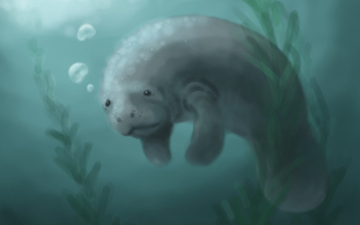
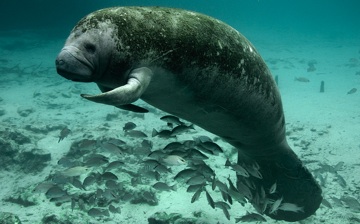
3 POINTS
• Trichechus manatus has as MOVE of 2.
• Trichechus manatus uses its large tail to propel itself forward.
Cool, Warm
Graphic by soyrwoosoyrwoo.deviantart.com/
Photo by Keith Ramoswww.flickr.com/photos/usfwsendsp
As its name implies, the West Indian manatee lives in the West Indies, or Caribbean, generally in shallow coastal areas. However, it is known to withstand large changes in water salinity, and so has also been found in shallow rivers and estuaries. They can live in fresh water, saline water, and even brackish water. It […] read more